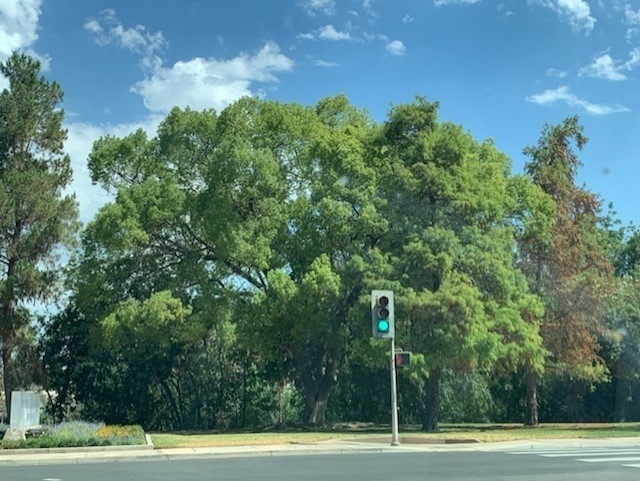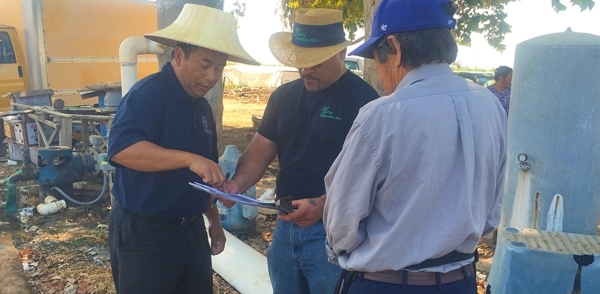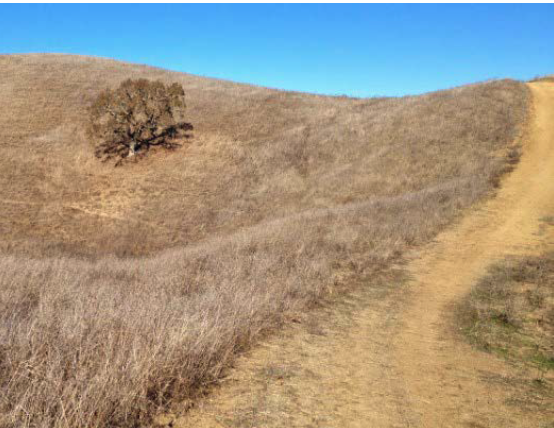Posts Tagged: Research and Extension Center
Postharvest Center: New research focus and outreach
Still providing the world with top-notch information
UC Davis has been a leading source of information for people handling, packaging and transporting crops since the beginnings of the Postharvest Research and Extension Center in 1979. Now, the center is strengthening its focus on the needs of industry, offering fresh courses, weaving strategic partnerships and expanding into digital media, all while building up its research capacity to better serve the needs of the produce industry.
“We're asking people in the industry, ‘How can we support you? How can we better listen to you?' We want people to know we're not disconnected know-it-alls,” said new center co-director Bárbara Blanco-Ulate, an associate professor in the UC Davis Department of Plant Sciences. “We're getting more faculty involvement, people with expertise in related fields such as quality engineering and safety, as well as bringing in emeriti faculty and people from around California. We're forming partnerships with organizations around the world, and we've opened up to people from other institutions around the country.”
“The larger the network, the more things we can do,” added fellow co-director Irwin R. Donis-Gonzalez, an associate professor of UC Cooperative Extension in the Department of Biological and Agricultural Engineering.
The foundation: Expanded research
The new co-directors will beef up the center's applied science component with the hiring of a research specialist. They aim to provide new information that can be used industry-wide as companies explore new ways to handle and store fresh produce.
“We're building the capacity to respond to industry requests for research,” Blanco-Ulate said.
New courses, national reach
Their first workshop, held recently, demonstrates the center's renewed vision and commitment to broad networking: The Agricultural Water Systems Workshop addressed current concerns around water management and risks to food safety. Partners in the course included the Western Growers Association, the University of Arizona, the University of Florida and Salinas-based Taylor Fresh Foods, Inc.
Courses given over the past several years that have been recorded will be posted to the center's new, online video library and to the center's YouTube channel.
“People can watch those courses for free,” Blanco-Ulate said. In addition, new courses will be offered in-person and hybrid.
The co-directors are working with the University of California to offer continuing and professional education credits to course participants.
Online resources – many for free!
The center's website features a database with scores of free product fact sheets, which are downloaded by users around the world. The fact sheets are so highly regarded that they are considered expert evidence in legal proceedings, Blanco-Ulate said. Visitors to the website can also find links to research papers published by UC Davis faculty, including seminal works by Adel Kader, who founded the center.
Books are offered through the center's online bookstore and include titles through UC Agriculture and Natural Resources. Ten new titles are being planned, including topic-specific updates taken from previous classics.
Debunking myths: Ethylene
A new newsletter deals with a new problem: Misinformation about food and food handling that spreads through social media. One example is the use of ethylene to ripen produce such as bananas, so that they can be safely stored until ready for the consumer.
“Ethylene is safe for humans and does not leave any harmful residue on produce,” Donis-Gonzalez wrote in the center's latest newsletter. Even better news, he added: The levels of ethylene used on food are a tiny fraction of the concentrations that would be needed to create an explosion, one of the false alarms being raised in social media.
Evolving with the times
After 47 years of service, these and more updates will keep the center at the forefront of an evolving postharvest world. The top goal: Meet the needs of agriculturalists, industry and consumers.
“We are adapting to new needs, with both the resources and the workshop we're offering,” Donis-Gonzalez said.
“As a land-grant institution, we take our outreach mission seriously,” Blanco-Ulate added.
Related links
More about the UC Davis Postharvest Research and Extension Center.
This story first appeared on the UC Davis Department of Plant Sciences site.
Haver named REC System director
It is my pleasure to announce that Darren Haver has accepted the position of Director of the Research and Extension Center System, effective July 1, 2023.
Darren, who joined UC ANR in 1999 as a postgraduate researcher, has worked his way up the UC Cooperative Extension ranks. He started as a UCCE water quality program representative in 2001, served as watershed management associate advisor for Orange and San Diego counties from 2003 to 2007, then became water resources/water quality advisor for Orange and Riverside counties in 2007 to 2009.
He has been the UC South Coast Research and Extension Center director and UC Cooperative Extension water resources advisor for Orange County since 2009. From 2011 to 2020, Darren added UCCE director for Orange County to his responsibilities. For the past five years, he has served as associate director of the REC system.
As REC system director, Darren will provide coordination, leadership and advocacy for the nine research and extension centers and oversee the REC Administrative Office. Working closely with me, he will implement the REC system's strategic plan and improve connections between research, extension and outreach functions.
He will be working with the Executive Director of Resources Planning and Management, the Director of Facilities Planning and Management and REC personnel at all nine RECs on capital projects.
Darren is the quintessential leader. He is the perfect choice to lead our research and extension centers across California. His collaborative approach and experience with the REC system will bring stability and a uniformity of practices with researchers, growing organizations and the public. We are very excited to watch the REC system grow under his leadership and that of our outstanding REC directors.
Darren will remain based at UC South Coast REC, but we will be recruiting to fill the UC South Coast REC director position.
I hope you will join me in wishing Darren success as Director of the Research and Extension Center System.
Brent Hales
Associate Vice President, Programming and Strategic Initiatives
Climate-Change Resources
University of California UC ANR Green Blog (Climate Change and Other Topics) https://ucanr.edu/blogs/Green/index.cfm?tagname=climate%20change (full index)
Examples:
- Save Trees First: Tips to Keep Them Alive Under Drought https://ucanr.edu/b/~CdD
- Landscaping with Fire Exposure in Mind: https://ucanr.edu/b/~G4D
- Cities in California Inland Areas Must Make Street Tree Changes to adapt to Future Climate https://ucanr.edu/b/~oF7
Drought, Climate Change and California Water Management Ted Grantham, UC Cooperative Extension specialist (23 minutes) https://youtu.be/dlimj75Wn9Q
Climate Variability and Change: Trends and Impacts on CA Agriculture Tapan Pathak, UC Cooperative Extension specialist (24 minutes) https://youtu.be/bIHI0yqqQJc
California Institute for Water Resources (links to blogs, talks, podcasts, water experts, etc.) https://ciwr.ucanr.edu/California_Drought_Expertise/
UC ANR Wildfire Resources (publications, videos, etc.) https://ucanr.edu/News/For_the_media/Press_kits/Wildfire/ (main website)
-UC ANR Fire Resources and Information https://ucanr.edu/sites/fire/ (main website)
-Preparing Home Landscaping https://ucanr.edu/sites/fire/Prepare/Landscaping/
UC ANR Free Publications https://anrcatalog.ucanr.edu/ (main website)
- Benefits of Plants to Humans and Urban Ecosystems: https://anrcatalog.ucanr.edu/pdf/8726.pdf
-Keeping Plants Alive Under Drought and Water Restrictions (English version) https://anrcatalog.ucanr.edu/pdf/8553.pdf
(Spanish version) https://anrcatalog.ucanr.edu/pdf/8628.pdf
- Use of Graywater in Urban Landscapes https://anrcatalog.ucanr.edu/pdf/8536.pdf
- Sustainable Landscaping in California https://anrcatalog.ucanr.edu/pdf/8504.pdf
Other (Non-UC) Climate Change Resources
Urban Forests and Climate Change. Urban forests play an important role in climate change mitigation and adaptation. Active stewardship of a community's forestry assets can strengthen local resilience to climate change while creating more sustainable and desirable places to live. https://www.fs.usda.gov/ccrc/topics/urban-forests
Examining the Viability of Planting Trees to Mitigate Climate Change (plausible at the forest level) https://climate.nasa.gov/news/2927/examining-the-viability-of-planting-trees-to-help-mitigate-climate-change/
Reports and other information resources coordinated under the auspices of the United Nations and produced through the collaboration of thousands of international scientists to provide a clear and up to date view of the current state of scientific knowledge relevant to climate change. United Nations Climate Action
Scientific reports, programs, action movements and events related to climate change. National Center for Atmospheric Research (National Science Foundation)
Find useful reports, program information and other documents resulting from federally funded research and development into the behavior of the atmosphere and related physical, biological and social systems. Search and find climate data from prehistory through to an hour ago in the world's largest climate data archive. (Formerly the "Climatic Data Center") National Centers for Environmental Information (NOAA)
Think tank providing information, analysis, policy and solution development for addressing climate change and energy issues (formerly known as the: "Pew Center on Global Climate Change"). Center for Climate & Energy Solutions (C2ES)
Mapping Resilience: A Blueprint for Thriving in the Face of Climate Disaster. The Climate Adaptation Knowledge Exchange (CAKE) was launched in July 2010 and is managed by EcoAdapt, a non-profit with a singular mission: to create a robust future in the face of climate change by bringing together diverse players to reshape planning and management in response to rapid climate change. https://www.cakex.org/documents/mapping-resilience-blueprint-thriving-face-climate-disaster
Cal-Adapt provides a way to explore peer-reviewed data that portrays how climate change might affect California at the state and local level. We make this data available through downloads, visualizations, and the Cal-Adapt API for your research, outreach, and adaptation planning needs. Cal-Adapt is a collaboration between state agency funding programs, university and private sector researchers https://cal-adapt.org/
Find reports, maps, data and other resources produced through a confederation of the research arms of 13 Federal departments and agencies that carry out research and develop and maintain capabilities that support the Nation's response to global change. Global Change (U.S. Global Change Research Program)
The Pacific Institute is a global water think tank that combines science-based thought leadership with active outreach to influence local, national, and international efforts to develop sustainable water policies. https://pacinst.org/our-approach/
Making equity real in climate adaptation and community resilience policies and programs: a guidebook. https://greenlining.org/publications/2019/making-equity-real-in-climate-adaption-and-community-resilience-policies-and-programs-a-guidebook/
Quarterly CA Climate Updates and CA Drought Monitor Maps (updated each Thursday) https://www.drought.gov/documents/quarterly-climate-impacts-and-outlook-western-region-june-2022
Tribal Engagement at the Hopland Research and Extension Center
The Hopland Research and Extension Center is situated on the traditional, ancestral and unceded lands of the Shóqowa and Hopland People, whose historical and spiritual relationship with these lands continues to this day and beyond (for more on the Land and people history of the site, see this story map). It was, and continues to be, difficult for Indigenous people to thrive in the Shanél Valley after they were forced off the fertile land and had to resettle on relatively small upland parcels and away from freshwater sources. UC ANR staff and academics at the Hopland Research and Extension Center are working to build relationships with the Hopland Band of Pomo Indians who live and work next door at the Hopland and Nacomis Rancherias.
Hopland REC Director John Bailey is committed to building relationships with the intention of enabling maximum benefits for local tribal communities. Tribal Chairperson Sonny Elliot and the Council have been helping us find ways to collaborate after a long history of distrust and despite the University's founding using the sales of expropriated lands (Land-Grant College Act, 1862) and our continued occupation of California Indian territories. Bailey is working with local tribes to define a newly funded Academic Advisor position to build relationships, advance UC policy around working with Tribes, and restore good fire to the landscape with the help of cultural practitioners.
We have secured funding to hire a Native college student to help revitalize ecocultural wetlands in Hopland this summer. The intern will spend time talking with Indigenous people living within the oak woodland landscape or North Coast California and develop a plan for stewarding ecoculturally important sites at the Hopland Research and Extension Center with the Hopland Band of Pomo Indians and local experts in traditional ecological knowledge. This internship offers an opportunity for a Native American college student or two to learn about wetland systems and traditional ecological knowledge; and share their experience with other tribal community members.
Hunting opportunities for Tribal youth and their families and plant collection sites for basket materials are available. The hope is that more cultural ceremonies can take place where generations of Pomo people spent time near the waterways that span Hopland REC. Finally, together we are exploring ways to modify access of existing roads at Hopland REC to allow for potential emergency evacuation for Rancheria residents.
More to come, we hope.
Drought focus of Water Resources IMPACT magazine special issue
UC ANR experts address emotional toll of drought
Preparing the American West for prolonged drought is the focus of a double issue of Water Resources IMPACT magazine. The California Water Commission staff are guest editors for this special open-access edition of the magazine, which is published by the American Water Resources Association.
Faith Kearns, academic coordinator of University of California Agriculture and Natural Resources' California Institute for Water Resources, is among the authors delving into how drought impacts people and the environment and how we can better prepare for the inevitable.
The first issue, published on Feb. 14, focuses on water scarcity issues confronting California and the ways these issues affect different sectors.
In “Trauma, Care, and Solidarity: Addressing the Emotional Toll of Chronic Drought,” Kearns highlights the effects of drought on mental health. She points to the spike in suicide hotline calls when wells ran dry in Southeast Asian communities in California's Central Valley.
By listening to Southeast Asian farmers, Ruth Dahlquist-Willard and Michael Yang of UC Cooperative Extension were able to “lighten the load” for them by providing pragmatic support, Kearns writes.
“The scale of some of these highly emotional issues – drought, wildfires, climate change – can make them seem incredibly difficult, if not impossible, to deal with,” Kearns said. “At the same time, they are affecting everyone living in the western U.S. on a daily basis. I wanted to highlight and provide models based on work that people – whether they are researchers, clinical psychologists, or Cooperative Extension advisors – are doing right now to ease the way.”
The authors who contributed to the double issue are a diverse array of Tribal experts, academics, nongovernmental organization thought-leaders, water managers and water policy influencers, each of whom brings their own perspective on the topic of drought. Their expertise and perspectives in climate science, water policy and water management will help inform drought-related decision-making and support policies that better prepare the state to thrive during periods of prolonged water scarcity.
In addition to Kearns, the first issue includes articles contributed by:
- Samantha Stevenson, University of California, Santa Barbara
- Jay Lund, University of California, Davis
- Ron Goode, North Fork Mono Tribe
- Andy Fecko, Placer County Water Agency
- Jeff Mount, Public Policy Institute of California, and Ted Grantham, University of California, Berkeley/UC Cooperative Extension
- Nat Seavy and Karyn Stockdale, National Audubon Society
- Kjia Rivers, Community Water Center
- Cannon Michael, Bowles Farming
- Michelle Reimers, Turlock Irrigation District
The January/February edition of Water Resources IMPACT magazine can be accessed, free of charge, on the American Water Resources Association website at https://www.awra.org under “Publications.”
The second issue, to be published in March, will focus on drought response, considering the options for adaptation. This two-part series complements the Commission's work on strategies to protect communities and fish and wildlife in the event of a long-term drought.









